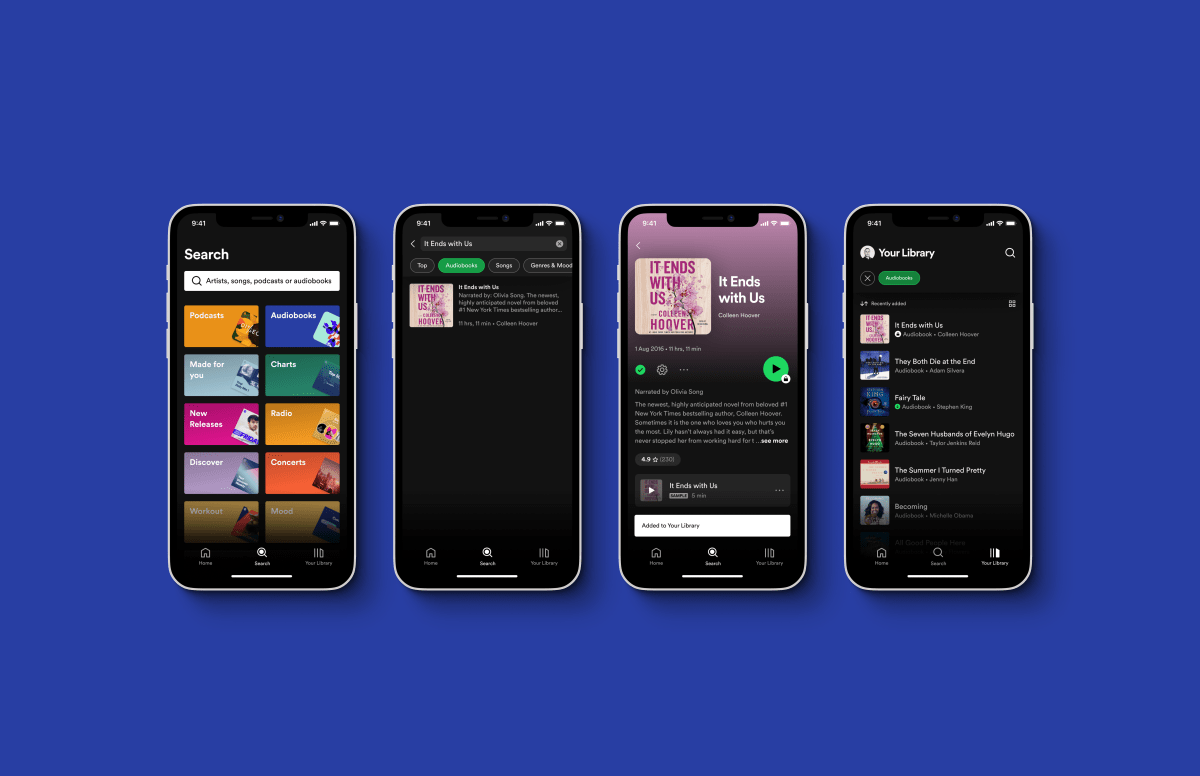Spotify is expanding its newly launched audiobooks service outside the U.S., the company announced today. The service will now become available in other English-speaking markets, including the U.K., Ireland, Australia and New Zealand, allowing users to access Spotify’s catalog of audiobook titles from the streaming app.
The company first launched support for audiobooks in the U.S. this September, offering users access to over 300,000 audiobook titles. These are discoverable within a new “Audiobooks” hub in the Spotify app as well as in curated recommendations. Initially, Spotify editors would be selecting titles to recommend to the streaming app’s users, the company had said. But, over time, Spotify plans to use algorithmic recommendations to suggest titles to users — much as it does today with its other supported audio formats, like music and podcasts.
The company confirmed to TechCrunch that consumers in the newly added markets will also have access to the same number of titles as those in the U.S. do (300,000+) but declined to share any metrics related to how many Spotify users have taken advantage of the option to buy audiobooks following the service’s launch.
Similar to other audiobook apps, Spotify offers a standard set of features, including the ability to download titles for offline listening, rate titles, adjust the playback speed and listen across devices.
However, the implementation of audiobooks in the Spotify app leaves much to be desired from the consumer’s perspective. The company doesn’t want to make the titles available through in-app purchases, where it would have to pay Apple or Google a commission on its sales. That means users have to first visit Spotify’s website to purchase the book, pay Spotify directly, then return to the app to actually access the title. What’s more, Spotify isn’t linking to its website from its mobile app. Instead, when a user taps “play” on the audiobook they’re interested in, a message appears that explains: “You can’t buy audiobooks in the app. We know, it’s not ideal.”
Spotify CEO Daniel Ek, whose company filed an antitrust complaint against Apple with the European Commission nearly four years ago, cited this problem as yet another way that Apple is “doing serious harm to the internet economy” and “choking competition,” he wrote in a blog post about the audiobook service’s challenges.
Other services have worked around Apple’s rules in different ways. For example, Amazon-owned Audible sells subscriptions and “credits” to buy audiobooks via in-app purchases.
Apple, hoping to fend off regulation, had updated its policy this year to allow “reader” apps, including audiobook providers, to link from their app to their website in order to allow the app’s users to create or manage their accounts. Spotify implements this feature from its account settings section, where users can now view which plan they currently pay for and can tap on other options to upgrade or downgrade their plan. This then redirects them to Spotify’s website. Here, too, the company tells users “You can’t make changes to your plan in app. We know it’s not ideal.” However, it doesn’t point users to the audiobooks section of its website from this settings screen.
Spotify said it plans to improve the discovery of its audiobooks over time, in addition to expanding the feature to new markets and introducing new formats and new ways to interact with audiobook content. The company suggested audiobooks could serve as a new revenue stream when it acquired digital audiobook distributor Findaway last year, saying the industry is expected to grow from $3.3 billion as of 2020 to $15 billion by 2027.
